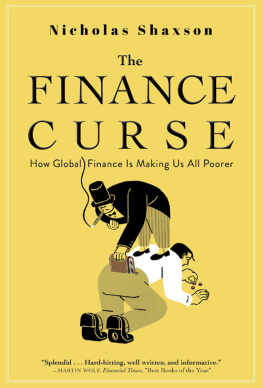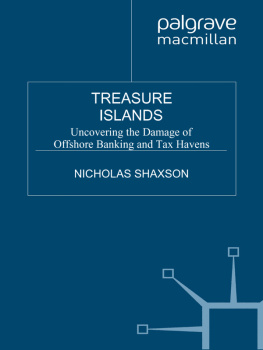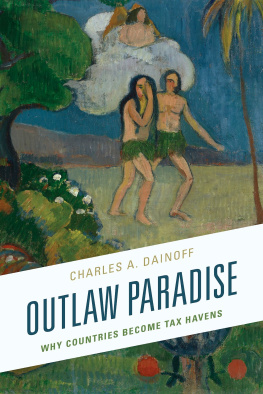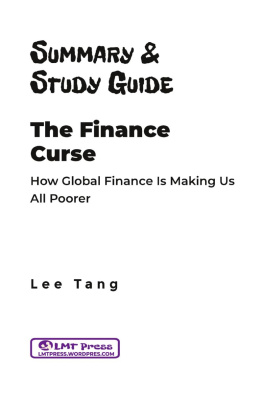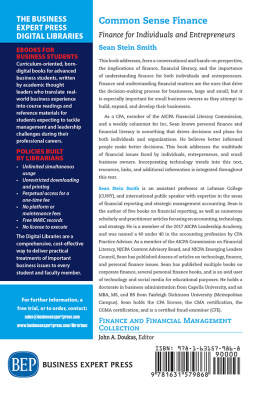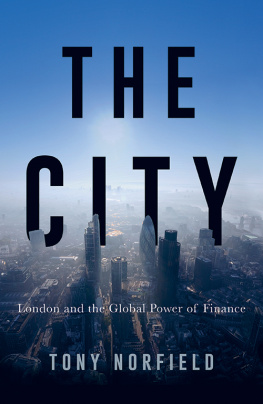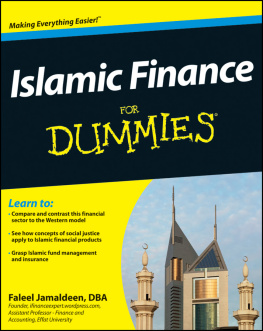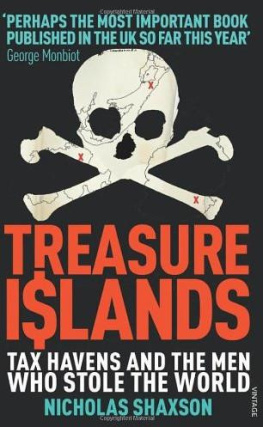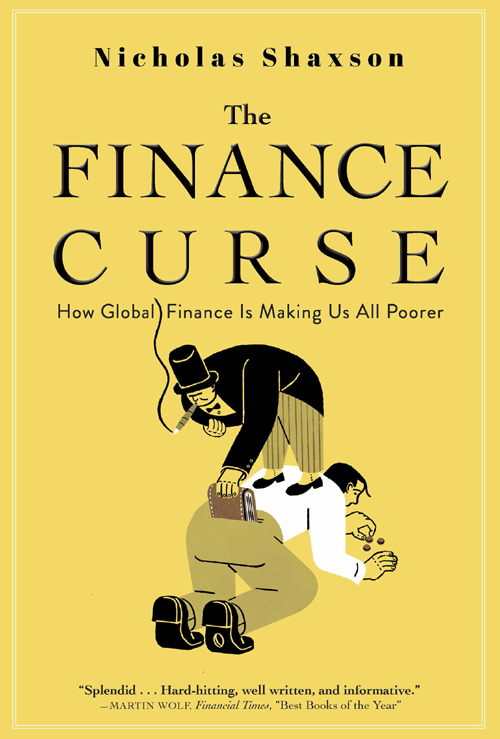Poisoned Wells:
The Dirty Politics of African Oil
Treasure Islands:
Tax Havens and the Men who Stole the World
Nicholas Shaxson
The
FINANCE CURSE
How Global Finance Is Making Us All Poorer

Copyright 2018, 2019 by Nicholas Shaxson
Cover design by Michael Patrick Dudding
Cover illustration David Plunkert
All rights reserved. No part of this book may be reproduced in any form or by any electronic or mechanical means, including information storage and retrieval systems, without permission in writing from the publisher, except by a reviewer, who may quote brief passages in a review. Scanning, uploading, and electronic distribution of this book or the facilitation of such without the permission of the publisher is prohibited. Please purchase only authorized electronic editions, and do not participate in or encourage electronic piracy of copyrighted materials. Your support of the authors rights is appreciated. Any member of educational institutions wishing to photocopy part or all of the work for classroom use, or anthology, should send inquiries to Grove Atlantic, 154 West 14th Street, New York, NY 10011 or permissions@groveatlantic.com.
Originally published in Great Britain by The Bodley Head in 2018, this edition has been revised for American publication.
Published simultaneously in Canada
Printed in Canada
First Grove Atlantic hardcover edition: November 2019
This book was set in 11-pt Janson Text by Alpha Design & Composition of Pittsfield, NH
Library of Congress Cataloging-in-Publication data is available for this title.
ISBN 978-0-8021-2847-8
eISBN 978-0-8021-4638-0
Grove Press
an imprint of Grove Atlantic
154 West 14th Street
New York, NY 10011
Distributed by Publishers Group West
groveatlantic.com
19 20 21 22 10 9 8 7 6 5 4 3 2 1
For Emma, Oscar, and George
In the early 1990s I was the correspondent for Reuters and the Financial Times in mineral-rich Angola in west Africa, which was then supplying more than 5 percent of all US oil imports and which the United Nations reckoned was suffering the worlds worst civil war. Angola was, on paper, one of Africas wealthiest countries, but on standard measures of human development it was almost the poorest. As UNITA rebels rampaged across the countryside, digging up diamonds to pay for their war machine, I flew into besieged cities in the interior in corkscrew dives to avoid antiaircraft fire, to try to make sense of what was going on. In the government-held capital of Luanda I remember the sight of upside-down legs kicking and wriggling from the tops of stinking hot garbage Dumpsters, as scab-encrusted war orphans in diesel-soaked clothes dived for food and other treasures discarded by the beneficiaries of the oil wealth. These kids, some of whom slept at night in sewers to hide from robbers and the police, would surround me on street corners, tickling my elbows, wheedling for cash, crooning Amigo! Amigo! to try to establish a friendship with the white man. Often, though, they used two different words: Chefe! or Patro! the Portuguese words for boss or patron. This would, they reasoned, oblige me to fulfill my assigned role and look after them as my loyal underlings. Most days, Id donate something to Kwanza and the boys, six or seven cheerful rascals who lived on my hotels street corner, and they defended me fiercely against all comers. Sometimes, I felt as if they would have fought to the death to protect me.
These kinds of relationships were woven into the countrys economic and political tapestry, especially in the hierarchy of political power, where the rich and influential handed out goodies to their underlings in exchange for their support. At the time, oil and diamonds made up more than 99 percent of Angolas exports, and it was quickly obvious to me that economic theories about supply and demand and interest rates that were being taught in Western schools made no sense here. To begin to understand an economy so extremely dependent on minerals, it helps to picture it as a swollen river, which fans out into a widening delta system of ever more numerous rivulets. Flotillas of boats loaded with treasuremeaning the oil wealth, in Angolas caseglide downstream, and gatekeepers extract tolls from the passing boats. The big diversions occur far upstream, and as the river flows onward and splits and branches, there is steadily less to go around. These street children lived out at the furthest end of the river delta, where all that was left for them lay at the bottom of a bug-infested dumpster.
Every Western visitor to Angola had a version of the same question: How could the people of a country with such vast mineral wealth be so shockingly destitute? War and corruption were part of the answer, of course. A venal leadership in Luanda was stealing the oil money, eating lobster and drinking champagne on Luandas beaches, while its ragged and malnourished compatriots slaughtered each other out in the dusty provinces. But something else was going on too. I didnt know it then, but I was getting a frontline view of a grand new thesis that academics were just starting to put together, now known as the resource curse.
Many countries dependent on income from natural resources tend to grow more slowly and suffer more corruption, greater conflict, more authoritarian politics, steeper inequality, and greater poverty than their resource-poor peers. Its not just that powerful crooks steal the nations mineral bounty and stash it offshore, though that is also true. The big point is that all this money flowing from natural resources such as oil can make their populations even worse off than if those riches had never been discovered. In short, more money can make a country poorer. Thats why the resource curse is also sometimes known as the paradox of poverty from plenty. The curse affects different countries in different ways; some countries, like Norway, have apparently benefited from their minerals, but few in war-ravaged Angola back in the early 1990s doubted that the minerals were a curse.
As I was writing about the destitution and the bloody carnage in Angola, John Christensen, the official economic adviser to the British tax haven of Jersey, was reading my articles and noticing some weird parallels with what was happening at home. I was fascinated by this counterintuitive concept that too much oil and gas wealth could make you poorer, he recalled. Jersey, which was dominated not by oil but by a swollen offshore financial industry based on secrecy and low- or zero-tax facilities, was suffering some of the same symptoms. The more I read about it, the more I thought, But this is Jersey! he said. And he understood a bigger point: it wasnt just finance-dependent Jersey that was suffering something akin to Angolas resource curse. Other countries whose financial sector had grown too dominantsuch as Britain and the United Stateswere exhibiting some of these same symptoms. Christensen had by then left Jersey, horrified by the venality and corruption he had witnessed in this little British tax haven, and set up the Tax Justice Network, an organization dedicated to understanding and fighting against offshore finance.
We met in 2006 and began to discuss the similarities between oil-rich countries and finance-dominated ones. We resolved to work together to create a new analysis, which we began to call the finance curse.

